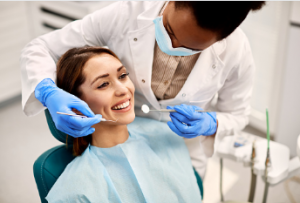A dentist is a doctor who specialises in dental care. They are usually supported by a team of dental hygienists, technicians, therapists, and assistants. These professionals all work under the supervision of a dentist to provide quality oral health care for patients. Listed below are some of the different types of dental assistants. These dental professionals are crucial to the health of patients. In addition to dentists, hygienists can also perform some dental services in a dental office.
Dental hygienist
 A dental hygienist is a licensed professional who specialises in maintaining the health of the oral cavity. Licensed dental professionals who practice hygiene are members of a regulatory body or dental association. Licensed dental hygienists are highly trained and experienced in the care of patients. They are responsible for maintaining patients’ health by performing routine cleanings and analysing x-rays. They are also highly skilled in using modern dental equipment.
A dental hygienist is a licensed professional who specialises in maintaining the health of the oral cavity. Licensed dental professionals who practice hygiene are members of a regulatory body or dental association. Licensed dental hygienists are highly trained and experienced in the care of patients. They are responsible for maintaining patients’ health by performing routine cleanings and analysing x-rays. They are also highly skilled in using modern dental equipment.
To become a dental hygienist, you must complete an introductory course sequence. It will take a minimum of four semesters. Once you’ve completed your introductory courses, you will enter the clinical program. Seats in the clinical program will be allocated according to the cumulative GPA of the students who have completed the required 22-credit sequence. Students with GPAs of 3.36 or higher are eligible for admission to the clinical program. Students who don’t meet these minimum standards will have to transfer out of the dental hygiene curriculum. Consult the Port Adelaide for your dental care needs.
A career as a dental hygienist can be rewarding and satisfying. Although it requires minimal educational and licensure requirements, dental hygienists are expected to work with a wide range of patients, and the job demands vary with their age group and health status. They provide high-quality dental care for patients of all ages. They work closely with dentists to relay information to patients and determine patient instructions.
An associate degree in dental hygiene can lead to a career in dentistry. Students learn the fundamentals of oral health care, including patient assessment, diagnosis, documentation, and communication skills. These courses also prepare students for transfer to baccalaureate degree programs and related disciplines. Students acquire the skills necessary for communication and research. They must also apply their newly learned skills to solve common dental problems. When ready to enter the clinical setting, apply the skills you’ve learned throughout your undergraduate career. Consult the Port Adelaide for your dental care needs.
The ADA’s Dental Hygiene Examination is a national dental examination, and candidates can access their scores on the ADA website through their DENTPIN. However, you must have attended a CODA-accredited program to apply for the examination. The test consists of 350 multiple-choice items, focusing on dental health knowledge and patient cases. Therefore, studying hard is crucial if you are serious about becoming a dental hygienist.
Once you’ve graduated from school, you can practice as a dental hygienist. However, it would help if your state licensed you to practice dental hygienist. You can also earn a bachelor’s degree online through degree completion programs. You’ll need to pass the National Board Dental Hygiene Examination to become a licensed dental hygienist. The exam consists of 350 multiple-choice questions, broken into case-based and discipline-based components. You need a score of 75 or higher to pass.
Depending on your educational background, you can choose a four-year bachelor’s degree program or a two-year associate’s degree program. Both options require rigorous coursework and hands-on experience. However, a four-year program may be right for you if you already hold a dental hygiene license. Typically, the bachelor’s degree takes four years to complete and requires approximately eight to sixteen hours of hands-on practice per week.
Regular dental visits are an essential part of maintaining good oral health. Hygienists can make recommendations regarding oral care products and techniques. For example, an electric toothbrush or specialist toothpaste can help you maintain your dental hygiene routine and reduce the risk of cavities. Your hygienist can also recommend an electric toothbrush or mouthwash to reduce the risk of cavities. If you’re a smoker, your hygienist can recommend a suitable product for your situation.
